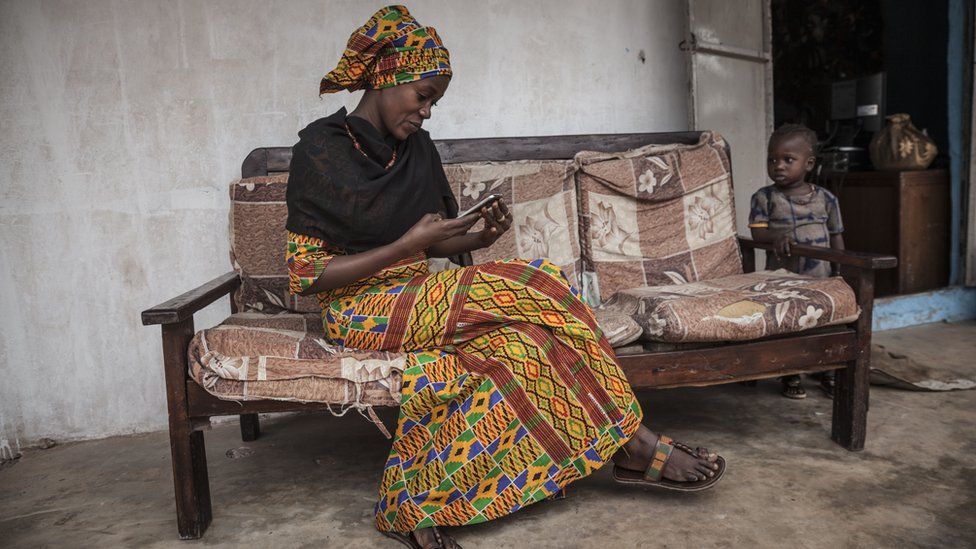The Gambia's answer to Coco Chanel
- Published

One woman isn't letting drought, mass emigration and political upheaval stand in the way of her dreams of building a fashion empire, says Colin Freeman.
If all it took were motivation, Tida Jallow's name might be up there with Mary Quant's or Coco Chanel's.
Her fashion boutique in her village in western Gambia is not one that has outlets in New York or Paris. And her home-made perfume, a scent called Blue Feeling, won't be on the shelves with Estee Lauder this Christmas.
But as we sat together outside her breeze-block shopfront, watching chickens and goats peck in the alleyway, I felt as if I was getting a pep talk from some high-powered fashion executive. A Gambian Anna Wintour, maybe.
Life is all about what you make it, she tells me. Self-belief is crucial. And, yes, that phrase we've all heard from our bosses once or twice: "There are no such things as problems, only opportunities."
Fair play to Tida, that last catchphrase has helped her earn a living. Gambian men, she reminds me, are entitled to take up to four wives, which means each can have a hard time getting her husband's affections.
That, though, is where a splash of Blue Feeling comes in. Made from the lavender bushes that grow wild round here, it's guaranteed to make you irresistible to your man. Or so Tida's marketing pitch goes.
The way things are in the village, though, there may soon be hardly any men left to woo anyway. For the last few years, more and more of them have been leaving, taking the bus not just out of the village but out of The Gambia altogether.
First they head north across the Sahara to Libya. Then it's on to the people-smuggling boats across the Mediterranean to Europe.
It's a pattern that's repeated right across this band of Africa, from here on the west coast to Somalia on the east. But it's a particular issue in The Gambia, which was ruled for more than two decades by President Yahyah Jammeh, before his surprise electoral defeat earlier this month.
He belonged to what might politely be called the strongman school of leadership. Not that politeness was something he bothered with much.
Earlier this year he was criticised when one of his political opponents was beaten to death in custody. He responded by telling both the United Nations and Amnesty International to go to hell.
President Yahyah Jammeh
His citizens, though, responded by going to Europe. In record numbers. One in 14 of those on people-smuggling boats from Libya this year was Gambian, according to the UN High Commissioner for Refugees
That's a lot for a country of less than two million. And though the majority are economic migrants rather than political ones, such was Jammeh's notoriety that most thought they stood at least a chance of claiming asylum.
His successor, Adama Barrow, who seemed as taken aback by his victory as anyone, has pledged to reverse the trend. But with severe drought in the country, and the economy still in a dire state, few are holding their breath.
In Gambia, the route across the Sahara has become so well-trodden that it even has a name. It's called the Back Way.
"I'd say about 50 people in this village alone have taken the Back Way," says Tida, "even though they know the stories about dying in the Sahara or drowning in the sea. At the mosque, they even say prayers for those already abroad, and for those about to make the journey."
Find out more
From Our Own Correspondent has insight and analysis from BBC journalists, correspondents and writers from around the world
Listen on iPlayer, get the podcast or listen on the BBC World Service or on Radio 4 on Thursdays at 11:00 BST and Saturdays at 11:30 BST
Those who do find work in Europe often wire some of their earnings back home. In Tida's village today, women in what are nicknamed "Western Union Marriages" often have smarter clothes and satellite TV dishes.
But the scale of the migration is now a concern here just as it is in Europe, albeit for different reasons. The exodus is draining The Gambia of its youth.
And if it continues, there may soon be hardly any young men left to bring the harvests in. Or indeed, to have children with after one of those Blue Feeling moments.
Tida is now taking part in a government scheme to encourage young people to stay. At her shop, she trains up apprentices on her sewing machines.
But even that's had problems. Armed with their new skills, four of her tailoring students have taken the Back Way themselves. As has her half-brother, who she trained up as a salesman. She recently found out that he'd died in Libya.
Was she ever tempted to take the Back Way herself, I asked? After all, she's pretty, ambitious and at 31, still looking for a husband. Might she not pursue her fashion career - and perhaps her love life - in London or Rome?
She shook her head. Life, she reminded me, was about what you did with it, not where. For other Gambians, though, it's going to take more than the smell of Blue Feeling to keep them at home.
Join the conversation - find us on Facebook, external, Instagram, external, Snapchat , externaland Twitter, external.